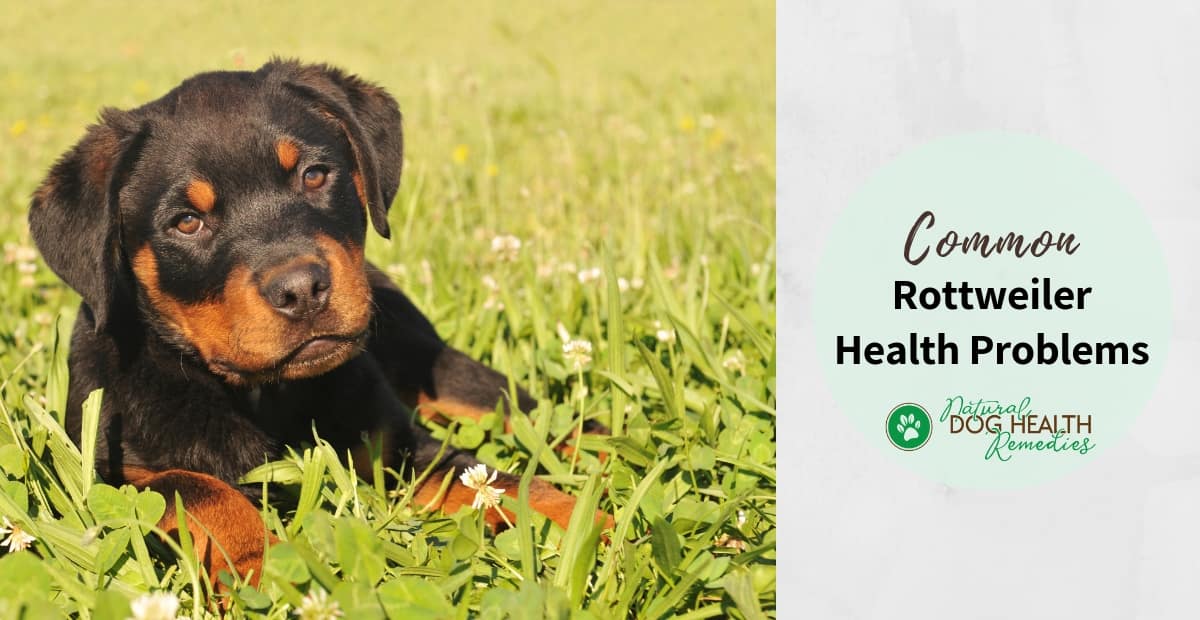Common Rottweiler Health Problems

Rottweiler Facts
The Rottweiler is intelligent, strong, and powerful. They are a symbol of great strength, agility and endurance. They have a very strong territorial instinct and will defend their home and family.
Sometimes, they may not seem to be as friendly as other breeds. Indeed, due to their aloof attitude, Rottweilers do not make immediate and indiscriminate friends.
The temperament of the Rottweiler breed varies from dog to dog. Some are fun-loving and affectionate, but some may be very reserved and obey only one family member.
As a working dog, the Rottweiler enjoys herding, competing in obedience, tracking, agility, and search and rescue.
The Rottweiler is a rather popular breeds in the U.S.A.- Ranked 8th most registered breed by the AKC for 2016.
Lifespan of Rottweiler
The average life span of a Rottweiler is between 8 and 12 years, in line with the life expectancy of large breed dogs.
The Rotties are susceptible to a number of health issues. This article will look at some common health problems and symptoms in Rottweilers.
Rottweiler Health Problems
Related To The Joints and Bones
Just like other large breed dogs, Rottweilers are susceptible to joint problems, such as:
- Hip Dysplasia: Hip dysplasia is a deformity of the hip joint.
If your Rottie has hip dysplasia, he will have problem getting up and walking with ease because of the pain and inflammation in the hip joints. The dog will have stiffness in the back legs and will be limping or walking with an abnormal gait.
Depending on how serious the problem is, surgery may be needed.
- Elbow Dysplasia: This is a hereditary disease (although it may also be caused by poor nutrition or injury), and characterized by the malformation of the elbow joints of the front legs.
If your Rottweiler has elbow dysplasia, you will see him limping and trying not to put weight on the affected limb. Signs and symptoms can start showing as early as four months of age. Depending on the seriousness of the problem, elbow dysplasia can sometimes be treated by surgery.
- Panosteitis: Panosteitis (aka "long bone disease," or "pano") is a health condition that can affect growing large breed dogs (between 5 and 12 months) such as Rottweilers.
Due to excessive bone production on the long bones of the front and hind legs, inflammation results causing pain and limping. Usually the affected dog will grow out of the problem by 18 months old, but it is painful.
The most important thing to remember is NOT to feed growing Rottweiler puppies a diet that is too high in protein to prevent them from growing too fast.
Rottweiler Health Problems Related to the Eye
These two rottweiler health problems are related to the eye:
- Cataract: Rottweiler is prone to congenital cataracts, which usually occur in both eyes and are either inherited or caused by infections or toxins while the puppies are still unborn.
If your Rottie has cataracts, you need to consult a veterinary ophthalmologist to see if surgery is needed.
- Progressive retinal atropy (PRA): PRA is a family of diseases that involves the gradual deterioration of the retina.
 Early stages of the disease usually result in poor night vision. As the disease progresses, daytime vision also fails. The dog's pupils will become dilated, and the lens of the eyes may become cloudy, or opaque, resulting in a cataract.
Early stages of the disease usually result in poor night vision. As the disease progresses, daytime vision also fails. The dog's pupils will become dilated, and the lens of the eyes may become cloudy, or opaque, resulting in a cataract.
PRA affects some dog breeds early in life, while other breeds can be affected much later. Rottweilers affected by PRA usually develop night blindness between 2-5 years of age and, within a year or so, can become blind totally.
Unfortunately, PRA cannot be cured. However, with their acute senses of smell and hearing, dogs who have lost their vision can compensate very well, particularly in familiar surroundings.
If your Rottweiler has PRA, you can help your dog live a normal life by developing regular exercise routes, maintaining consistent surroundings, introducing any necessary changes gradually, and being patient.
Other Rottweiler Health Problems
Other common Rottweiler health problems include:
- Bloating: Like other large breed dogs, Rottweilers are prone to this stomach problem, which could be fatal if timely treatment is not given.
Be sure to visit our article on Bloating in Dogs for more information.
- Addison's disease: Addison's disease is an endocrine condition in which there is insufficient corticosteroid secretion from the adrenal glands.
The symptoms of Addison's disease are not distinct (e.g. lethargy, vomiting, diarrhea, weight loss, muscle weakness...), making it difficult to diagnose.
If you suspect your Rottie has this disease, be sure to take him to the vet for a proper checkup.
- Aortic Stenosis (AS): This is one of the most common heart conditions seen in large breed dogs such as Rottweilers. AS is a condition in which there is a partial obstruction to the flow of blood as it leaves the left ventricle through the main blood vessel (the aorta) that carries blood to the rest of the body.
Because of the obstruction, the heart has to pump harder to push the blood through the opening, which over time can cause the heart to fail.
If your Rottweiler has a mild case of AS, you may not be able to notice the symptoms.
For dogs with a more serious condition, they will show exercise intolerance. Any relatively strenuous exercise can cause problems such as excessive panting and even fainting. Therefore, it is necessary to restrict the amount and intensity of exercise for Rottweilers with moderate to severe AS.
- von Willebrand's Disease (vWD): vWD is a common inherited blood disorder that affects the Rottweiler rather frequently.
Dogs with vWD does not have the clotting factor VIII antigen. Therefore, excessive bleeding is a hallmark symptom of this disease.
For example, the affected dog will bleed excessively (more than normal) if injured, or they may have frequent nosebleeds or bleeding from the gums. Some dogs may have internal organ bleeding (e.g. the stomach or intestine), and you may see blood in their urine.
Health Supplements for Rottweilers

Recommendations for Your Rottie!
This Chinese herbal formula contains effective herbs for joint problems such as hip dysplasia, arthritis, and stiffness due to inflammation of the joints. Works well as a preventive or as a remedy.
FURminator deShedding Tool for Dogs
Rottweilers have dense coats that shed throughout the year, with increased shedding once or twice a year. This FURminator tool helps to control shedding by removing the loose and dead undercoat hair without damaging the topcoat. Highly recommended!
Canada's Guide to Dogs
American Kennel Club





